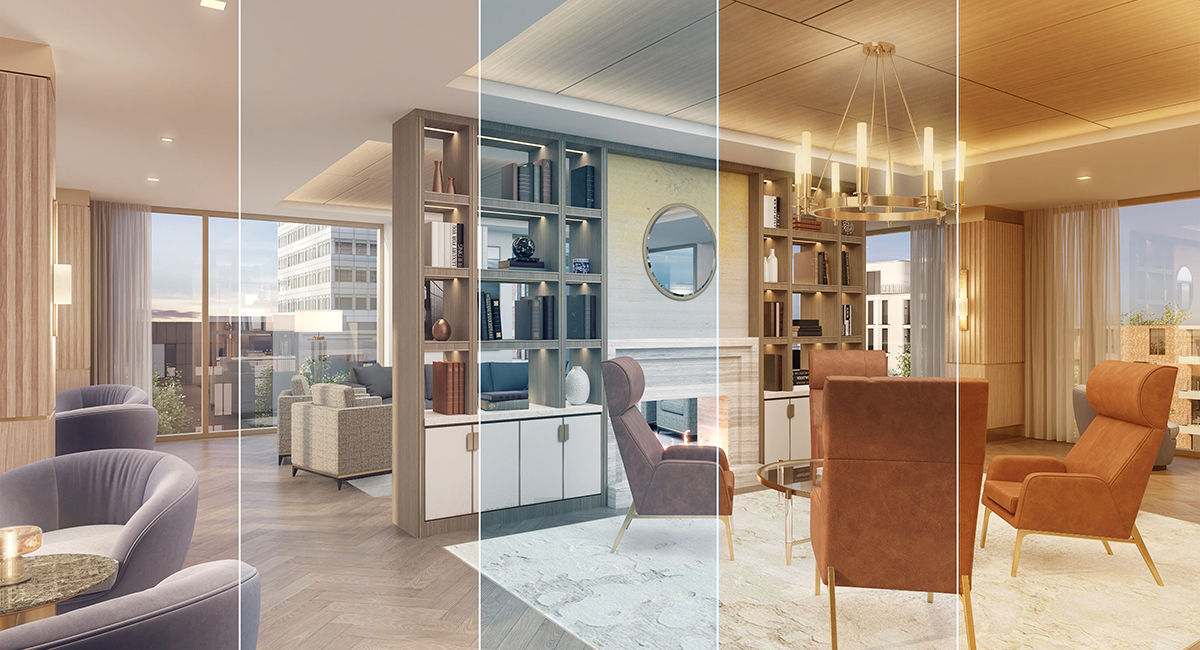July 15, 2022
4 min read
Coterie Utilizes Circadian Lighting to Advance Memory Care
Using science and technology to provide more effective memory care.

The human brain evolved to use sunlight as the primary signal for how and when to perform essential functions. Body temperature, blood pressure, metabolism – all are governed by circadian rhythms, by light receptors in our eyes telling the brain what time of day it is.
Scientists are beginning to unlock the connection between light and health and apply their findings to a modern world where people spend much of their time indoors. For memory care residents at Coterie Senior Living, those findings are at the forefront of improved care and a better quality of life. Featuring an integrated Lutron circadian lighting system in all common areas and private residences, Coterie Memory Care utilizes the transformative nature of light to help residents regulate sleep and mood.
What is Circadian Lighting?
In terms of producing biological benefits, all light is not equal. While the artificial light in most homes succeeds in letting us see well enough to perform tasks, it cannot create the circadian signals our brains require to regulate our bodies. To accomplish this, a circadian lighting system is specifically designed to replicate the daylight spectrum of the sun, making it easier for our brains to attune to its cycles even when indoors.
Brightness is only one consideration – color plays an important part, too. It’s now known that blue light wavelengths – the kind prevalent in sunlight – promote alertness by suppressing melatonin, the hormone that causes sleepiness. Blue light also stimulates and strengthens connections between areas of the brain that process emotion and language.
By slowly phasing out the blue light output throughout the late afternoon and early evening, the brain begins to release its natural melatonin and prepare the body for a restorative night’s rest.
Circadian Lighting and Coterie Memory Care
The impact of a lighting environment becomes more pronounced in the context of memory care. A study performed by the National Center for Biotechnology Information (NCBI) concluded that circadian rhythms influence most, and perhaps all, of the biological systems responsible for the progression of Alzheimer’s disease.
Many caregivers are familiar with the most common expression of this influence – a behavior known as “sundowning” – when those with Alzheimer’s or dementia experience agitation from their biological clocks confusing sleep-wake cycles. Poor sleep leads to fatigue the following day, which exacerbates symptoms, leads to excessive napping, and furthers one from alignment.
Circadian lighting intervenes in this negative cycle by providing strong daytime blue light to promote times of alertness and weaker nighttime signals to help the brain wind down and perform nighttime functions.
The NCBI study found that, for those with dementia, sleep disruption negatively impacted emotional well-being, physical functioning, social behavior, and cognition. This growing body of evidence indicates that sleep – regular, restful, and consistent – is perhaps the best medicine in memory care, and the one that dictates the effectiveness of other forms of treatment.
While NCBI’s studies have certainly advanced the understanding of circadian lighting’s impact on dementia patients, Erika Soto, Coterie Cathedral Hill’s Memory Care Director, has observed these benefits firsthand.
“Especially in the afternoons, our residents aren’t inquiring about the time of the day as much as they once did, because they’re seeing the lighting conditions change,” she says.
“Having those lights dim during sunset every night helps the staff guide them to bed at a reasonable time, and they stay asleep through the night.”
Coterie embraces science and technologies that open doors to better, more effective memory care. Circadian lighting is one iteration of this commitment – one that holds great promise by aligning residents with the restorative powers of the sun and sleep.
You might also like
Want to learn more about life at Coterie?